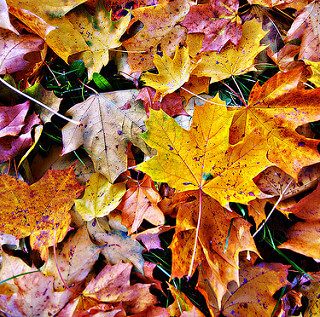
Allowing fallen leaves to blanket your lawn can cause significant damage to your turf, but with the correct approach you can recycle those leaves into leaf mulch or compost to benefit your landscape during the cold winter months.
Why Are Leaves a Threat to Your Turf?
Aside from not looking great once they turn brown, leaves can smother your grass by inhibiting water absorption and sun exposure, both of which are critical to the heath of your grass.
- Leaf buildup can also render fertilizer and other lawn treatments ineffective since the leaves may prevent them from reaching the soil.
- When the Atlanta area experiences a wet fall and winter, a moist layer of leaves can create an ideal atmosphere for fungus to grow. Fungal diseases can wreak havoc on your lawn and you may not even be aware of the damage until after your grass returns from dormancy in the spring. A variety of lawn funguses can include Brown Patch, Zoysia Patch, Dollar Spot and Pythium Blight.
- In cases of a mild and dry fall and winter season, allowing leaves to pile up on your lawn is a major fire hazard, which can be a serious risk to your family, pets and property.
What Are Your Options for Leaf Removal?
Traditionally, people rake or blow their leaves into a pile and then collect them in plastic or biodegradable yard bags that you can get from local grocery or hardware stores. Blowing is the preferred method as it doesn’t cause as much stress and breakage to the grass blade. Once the leaves are raked or blown together, they are placed in the bags on the street curb and then properly disposed of by your local waste management service.
- A more environmentally conscious option is to mulch your leaves, which then becomes a valuable resource for your landscape. When mulching your leaves, set your blade to three inches high. Note that it may take several passes to effectively shred the leaves down depending on the amount you’re dealing with. Some homeowners prefer to simply leave the finely chopped remnants on the lawn, which will then easily decompose into the soil by spring, adding valuable nutrients for your grass, trees and shrubs.
- The most rewarding, organic approach to leaf cleanup is composting. You want to attach the bag to your mower and collect the mulched leaves (or at least some of them) to be used around your garden. You can add a 3-inch layer of these mulched leaves to ornamental beds or toss them in your compost pile for later use. Finely shredded leaves return desirable nutrients back to your lawn and garden, and help support the microorganisms in the soil. And we all know that healthy soil equals a healthy lawn.
So, before those leaves start to pile up, causing a potential fire hazard or fungus situation to your lawn, collect them and make good use of them. Mulch or compost them as a great, effective and organic way for natural leaf removal.

